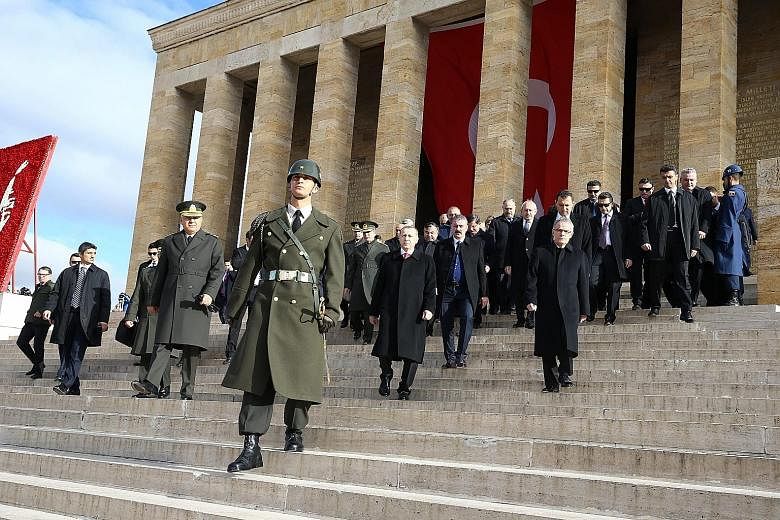ANKARA • Turkish President Recep Tayyip Erdogan yesterday called for reforms and the creation of a new Constitution in the next four years, steps that would move the country closer to the executive presidency he has long sought.
The ruling AK Party founded by Mr Erdogan swept back to single- party rule in a snap election on Nov 1, taking 317 of the 550 seats in Parliament, just shy of the 330 seats required to hold a referendum on changing the Constitution.
Mr Erdogan argues that Turkey needs an executive presidency similar to that of the United States or Russia, while his critics fear that will consolidate more power in the hands of an authoritarian leader who brooks little dissent.
"The Nov 1 election ushered in four years of stability and confidence. Let's make this period a time of reforms, prioritising a new Constitution," Mr Erdogan said at a commemoration ceremony for modern Turkey's founding father, Mustafa Kemal Ataturk, first president of the republic proclaimed in 1923.
The concerns regarding Turkey's present regime should be left aside so the country can focus on the future, Mr Erdogan added.
His comments were later echoed by Prime Minister Ahmet Davutoglu, who said Turkey would embark on a major reform process in the next six months and carry out economic, social and judicial reforms. He did not give further details.
Mr Davutoglu also said the new Constitution must ensure freedoms and be based on the separation of powers. The current system creates tensions between the president and the prime minister, he said.
But the European Commission expressed concern at Mr Erdogan's push for a constitutional overhaul.
The comments came yesterday in its annual progress report on Turkey, an EU candidate, whose decade-long accession talks with the European Union have stalled.
The EU criticisms were cloaked in diplomatic language, however, reflecting the political sensitivity of dealing with a large, strategically important country whose cooperation Brussels sorely needs in tackling Europe's migrant crisis.
"Turkey needs to move because there are many areas where they need to deal with basic principles, the fundamentals," EU Enlargement Commissioner Johannes Hahn told the European Parliament, referring to human rights and freedom of expression.
The EU urged Turkey to lift restrictions on media freedom, respect human rights and restart peace talks with Kurdish militants in the violence-racked south-east of the country.
The commission report comes at a difficult time for Turkey, where fighting has resumed between security forces and militants of the Kurdistan Workers' Party after the collapse of a ceasefire.
"The commission hopes to see an end to the escalating violence in Turkey and the return to negotiations on a lasting solution on the Kurdish issue," said Mr Hahn.
The progress report, whose publication was delayed until after the election to avoid upsetting Mr Erdogan and the AK Party, also praised Turkey for sheltering millions of refugees fleeing the civil war in neighbouring Syria.
REUTERS

